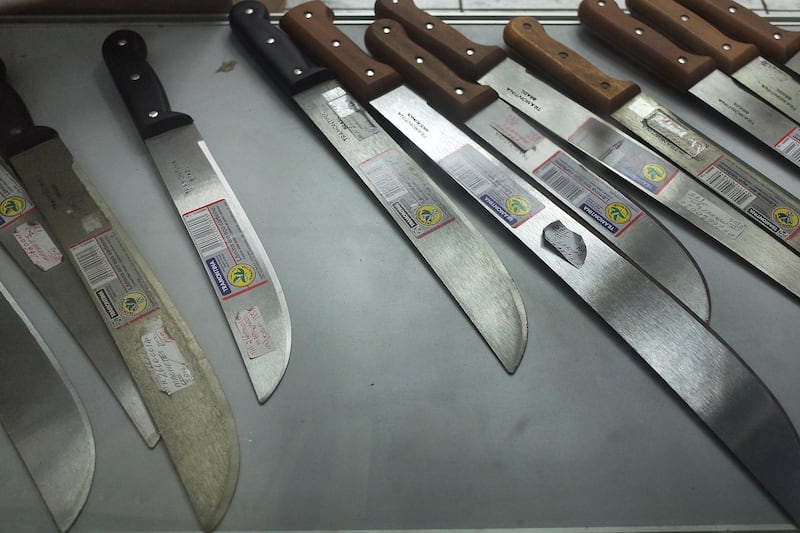Parents must lead the fight against knife crime and educate their children about the dangers of blades at an early age, senior legal figures say.
They added their voices to those of Federal National Council members who in recent years have called for a ban on the carrying of knives and swords.
The use of a blade as a weapon is an offence, but carrying one is not because of national traditions and a low crime rate.
Sheikh Saif bin Zayed, Deputy Prime Minister and Minister of Interior, last year told FNC members that the UAE recorded five violent crimes for every 100,000 residents, which equates to about 450 offences a year.
But the killing last week of a 16-year-old boy in Ajman sparked a debate about how best to tackle violent crimes.
In the wake of lethal knife crimes, parents were urged to take the lead by lawyers, judges and educational experts to educate their children about the dangers of carrying a blade.
Emirati lawyer Awatif Mohammed, from Al Rowad Advocates, said that control of bladed weapons began at home, before the authorities have a say.
Ms Mohammed said that possession of a blade was not a criminal offence but she believes it should be.
Legal consultant Hassan Elhais said that those arrested in possession of blades are not subject to punishment unless they were involved in a knife crime.
"One of the factors that would greatly contribute to curbing the number of knife crimes is tighter control on markets that offer them for sale," Mr Elhais said.
Saeed Nouri, an education expert and administrative adviser at Ajman Private School, who has been working in eductaion in the UAE since 1969, pointed out that the fight against knife crime was a team game where mothers and fathers have the leading role.
"Parents must observe their children, search their school bags and rooms, watch their behaviour, watch for change, talk to them and explain, send them messages they will grow up with," he said.
The Ministry of Education realised the importance of a curriculum that tackles such an issue, Mr Nouri said. This academic year, he said, a moral education book was introduced for pupils from Grade 1 to Grade 9.
“The book focuses on instilling better qualities in youngsters, such as respect for others, social competence, patriotism, and social responsibility. Qualities that will help them better identify risky situations and make better judgements on how to react,” he said.

Mohammed Rustom, head of family and juvenile prosecution in Dubai, urged parents to talk to their children about the dangers of blades.
“At the age of two, tell them it can hurt them or hurt their loved ones. At four, make them feel guilty if they carry a knife by mistake. At an older age, take away their iPad or favourite toy if they carry even a small kitchen knife. Monitor the cartoons they watch and don’t wait for them to ask – take the initiative to explain to them what they are watching,” he said.
Mr Rustom said that Dubai prosecution had been spreading awareness about the dangers of blades as part of its campaigns and programmes, mainly under the Nibras programme, which targets schoolpupils.
“We have seen change. Feedback from teachers shows impressive improvement in student behavior,” he said.
Aidah Omar Hussain, 45, a Palestinian mother of three, had been keeping an eye on her 14-year-old son after he told her a classmate was suspended for taking a blade to school.
“My son said his classmate was showing off with a sword he bought after saving his daily allowance. Since then, I have kept my eyes wide open and monitored every purchase my son makes because, with the sword fights we hear about, you never know what could happen. It’s better safe than sorry,” she said.
FNC member for Dubai, Hamad Al Rahoumi, said that knife crimes took place mostly in Emirati neighbourhoods and the majority of those involved were teens or young men and that their crimes claim the lives of Emiratis and residents alike. A draft law to combat knife crime would begin to eradicate this problem, he said.
A recent incident in Ajman that claimed the lives of two young men, then the one in Al Qusais that ended the life of a 16-year-old, clearly indicate that this type of crime poses a great risk to the security and safety of the public, Mr Al Rahoumi said.
"I raised the question during a session of the Ministry of Interior's legislative meeting, and Sheikh Saif answered, saying that this type of crime is 0.9 per cent of the total number of crimes in the country and that the ministry is working on drafting a law in co-ordination with the Ministry of Justice to combat knife crime," Mr Al Rahoumi said.
He attributed the rise in knife crime to the availability of blades in markets and to cultures in the UAE that consider blades part of local tradition.
Also, the thousands of films that depict carrying knives as a norm may encourage youth to possess one, he said.
_______________
Read more:
Three arrested over sword fight in which two Emiratis died
_______________
“We are in need of a law to restrict and control blade and knife use and we also should consider tighter control on repeat offenders after they are released from jail,” Mr Al Rahoumi said.
Criminal Court Judge Ayman Abdul Hakam expected the draft law to be ready within two months.
"The draft law comes as a reaction to the increased number of such crimes, which means that it will be ready in shorter time than usual, but I expect it would take an extra month to take effect," he said.
Mr Hakam said the law would probably include three articles, one to identify and list blades that are banned, a second to identify where possession is allowed and a third to outline punishment for infringement of the first article.
"We should not be prosecuting only those who use knives in crimes, but also those who possess them for no valid reason. For example, if you are not a butcher, why have a metal cleaver? That's why this draft law is very important, it will allow only people whose work requires the possession of blades, to actually have them," the judge said.
In July 2011, four Emiratis aged between 19 and 22, attacked their 15-year-old compatriot with swords in an attempt to kill him. In March 2015, five Emirati men aged between 22 and 33 killed a groom-to-be, 25, by stabbing him with a knife and a sword.
In March last year, a fight between 16 Chinese men – members of two rival gangs – armed with axes, swords and metal bars with sharp ends killed one and seriously injured another.
On January 6 this year, two Emiratis, aged 22 and 26, were murdered in a sword fight on Sheikh Mohammed bin Zayed Road in Ajman and, on January 22, a 16-year-old Emirati was stabbed to death in the street with a kitchen knife by another Emirati.







